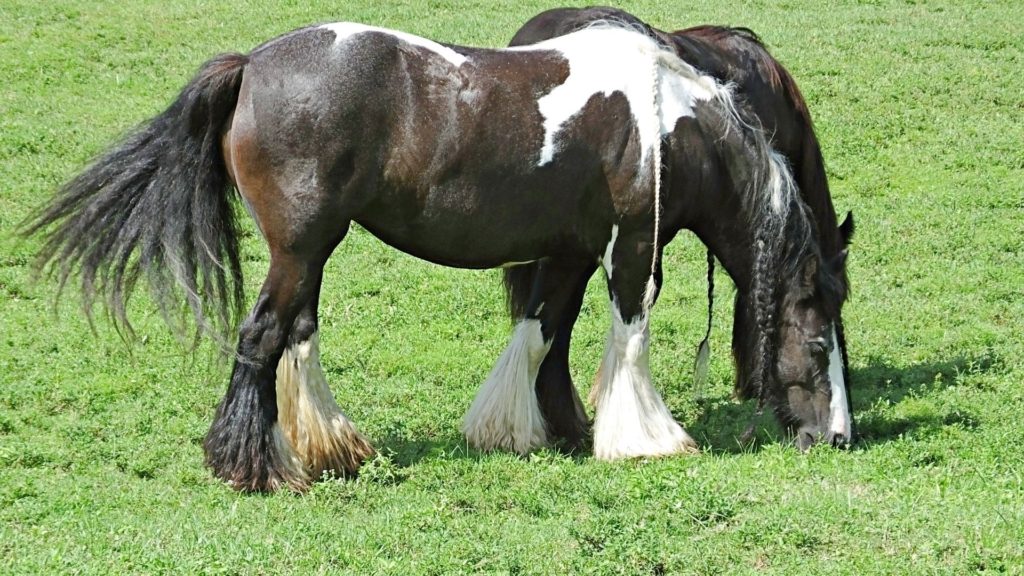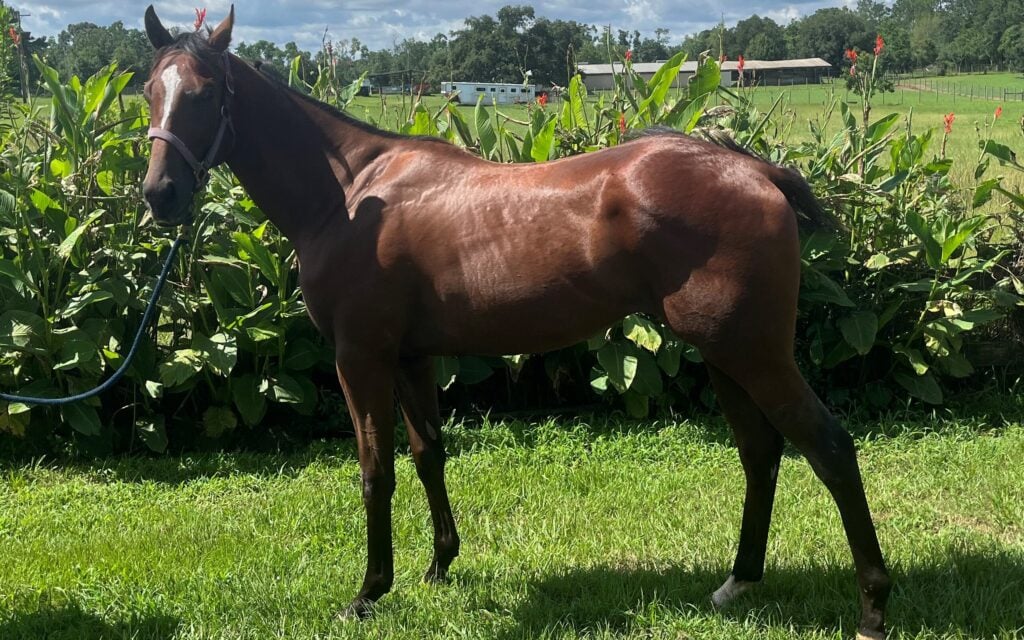Can You Feed Lawn Clippings to Horses
Any links on this page that lead to products on Amazon are affiliate links and I earn a commission if you make a purchase. Thanks in advance – I really appreciate it!
My grandson loves feeding our horses and knows never to leave clumps of cut grass for the horses to eat. He accepts it's an important rule but asked me a good question, "why does it matter since hay is made from cut grass and horses eat hay?"
Horses can not eat fresh-cut grass because they gobble it down without adequately chewing it, leading to severe health issues. Clumps of cut grass also attract mold and bacteria, resulting in severe and sometimes fatal stomach problems for horses when ingested.
But this doesn't mean that cut grass is not an option for a grazing horse. However, the grass needs time to dry out. Hay is made from cut grass, but it's processed and baled after drying. But for horses, eating fresh grass clippings is a bad idea.
If you want to learn more about why horses eat grass and what types of grass they eat, you should read Grass For Horses: Why it's Essential and the Different Types. But now, let's find out why it is not suitable for horses to eat grass clippings.

Why it's bad for horses to eat cut grass.
When horses are allowed to graze naturally, they take their time to look for suitable grass, rip it off the ground, and grind it down before eating more grass. Slow grazing is how their bodies are designed to consume and digest food.
However, when they are allowed access to large amounts of grass already cut, they are tempted to devour it. As a result, the grass isn't chewed adequately and swallowed too quickly for their bodies to handle.
I like to think of wet grass clippings as chewing gum to horses. Large chunks are squishy in texture, contain a lot of moisture, and have high sugar content. Your horse won't know when to stop eating!

Health conditions that can result from eating grass clippings
When you cut grass, it's best to move your horses from their pasture until the grass dries. Paddocks are great places to keep horses off the grass, or you can use a grazing muzzle to control their intake.
Inevitably horses find ways to get where they shouldn't be, and if your horse eats fresh-cut grass, the following are some of the severe health conditions that can occur.
Colic
Mold is attracted to moist and warm environments. There's a genuine concern of mold accumulating on clumps of grass clippings that are still wet. If your horse eats moldy grass, it may develop a common but painful gut condition known as colic.
Colic is broadly defined as abdominal pain and has many forms, but one common cause is overeating. Large amounts of grass clippings, especially those that haven't yet dried, stay undigested in the stomach and begin to ferment. This undigested grass can build up gas which exerts pressure on the gut and causes pain.

There are several ways to treat a horse with colic, depending on where and how the food got stuck. Diagnosing and managing colic as soon as possible is essential and is a job best done with a vet's advice.
Treatments may include hydrating the horse using electrolytes supplements, putting it on medications to counter colic symptoms, and even performing surgery if the food is stuck in the intestines. Here's a summary of how to effectively manage colic in horses.
Choke
Choke happens when the food gets stuck in the horse's esophagus (tube connecting the throat to the stomach). It can result in dehydration or infection if the food or any liquid comes in contact with the lungs.
One of the significant causes of choke is ingesting food that hasn't been chewed properly. If your horse develops choke after eating cut grass, you may notice slight changes in its behavior.
The horse may become uninterested in its feed. It will try to get the stuck food out by either coughing or shaking its neck downwards. Excessive drooling, the release of light mucus from the nostrils, and an abnormal increase in heart rate are also some of the things you should keep an eye out for.
If you suspect that choke has developed, don't give the horse any feed or water because it may worsen the condition. Treating choke requires special treatment by the vet, who will usually sedate the horse and then ease the esophagus using drugs or deploy a tube through the nostrils.
Laminitis
Because grass is rich in carbs, excess eating of freshly cut grass can practically cause an overload of sugar. A sugar overload causes a chain reaction in the gut and can result in chronic feet inflammation.
The condition is known as laminitis (founder). It can permanently cripple the horse or prove fatal in severe cases. If you have any suspicion that your horse is at risk of foundering, contact the vet immediately.
Did it start walking strangely, as if walking on needles? Is it suddenly reluctant to eat its feed? Even minor changes like which foot it rests its weight upon or abnormal warmth in the hoofs can indicate laminitis signs.
If your horse has laminitis, your vet will instruct a specific diet for your horse. Initially, you can't allow your horse to leave its stall or walk around at all. During this time, ensure you keep a thick layer of bedding in your horse's stall because it will likely lay down a lot.
Many horse owners believe euthanasia is the only choice for foundered horses, but there is a chance for recovery for some horses with time and proper treatment. I recommend reading this article I wrote regarding horse laminitis and how to treat it.
Can horses eat dry grass clippings?
My friend, a vet, tells me that she has to deal with horses sick from eating fresh-cut grass pretty regularly. In fact, one study established digestive diseases as the third most common cause of death in horses.
Horses can eat dry grass clippings that have been spread out or given in small amounts. In contrast, wet chunks of grass can become clogged in the horse's throat or intestines and cause a wide range of health problems.

How long after cutting the grass can you feed it to your horse?
When I bush hog my pastures, there are almost always fresh grass clippings left behind, and my horses love to graze. So I must know in advance when the grass will dry and is safe for them to eat.
Typically, grass that has been cut and widely spread out in the sun should dry out within a day. In contrast, grass cut in humid weather and left in clumps can take up to several days before it is safe for the horses to eat.
Drying time for cut grass depends on many things, including the length of time the grass is exposed to the sun, temperature, humidity, and even the kind of grass.
Most of us don't have sophisticated testing equipment to provide the moisture content of our grass clippings, so we need to judge our grass by feel, sight, and weight.
You can determine the drying time for your grass; compared to uncut grass, cut grass needs to lose about 70 – 80% of its moisture. Grass at 20 to 30 percent moisture rates is typically safe from mold and tough enough so horses will chew it before ingesting it.
I don't find it too difficult to gauge when the grass is drying enough for horses to eat; I pick up a handful and squeeze it firmly. When it's dry, you shouldn't feel very little if any moisture in the grass.
How can you dry your grass clippings faster?
Through constant trial and error, I've come to learn that there are a few crucial tips that can help your grass clippings dry out much faster. And since I have horses relying on good dry grass, I think everyone should know these tips.
For instance, mow your grass only when it's dry. So, don't cut your grass early in the morning when the dew is still present. If it rained recently or the weather is foggy, it's best to wait a while before cutting your grass.
Grass cut wet has a greater chance of coming together in clumps, which take longer to dry. These clumps of grass clippings are also harmful to your horse and vulnerable to mold and bacteria.
Additionally, wet grass doesn't usually cut as evenly as dry. It may also prevent a smooth mowing experience as it can frequently clog the chute.
Grass clippings spread out thinly are much preferable to narrow swaths. Check on your grass a few hours after mowing to break up any clumps that may have formed. Doing so can make the clippings dry out faster and preserve the integrity of the grass longer.

Conclusion
It is generally advisable to know how much grass clippings you leave for your horses to graze. If you've recently mowed your pasture grass and it's still wet, it's best to keep your horses away until it dries out.
Horses can eat cut grass that is dry, but quickly eating wet grass can cause dangerous health concerns. However, your horse can typically fully recover with early diagnosis and proper treatment.
Below is a YouTube video that discusses horses eating lawn grass clippings versus mowed pastures.
FAQ
What do horses like to eat?
Horses love apples, sugar cubes, and carrots for snacks, but their favorite meal is alfalfa hay in any form, pellets, cubes, or hay. Horses have sensitive digestive systems, so don't feed them too much sugar.
I wrote an article you may find interesting about horse treats: What Do Horses Like to Eat? 11 of Their Favorite Treats.
Is it ok to let my horse eat moldy hay?
No, it's not ok to let your horse eat moldy hay, and it could cause severe stomach problems. Moldy hay is dusty and full of harmful bacteria. It's similar to you or I eating rotten food, but with one big difference, we can vomit and get the bad stuff out of our system.
Horses can't vomit, so the rotten food stays in their stomach. You can learn more about the harmful effects of horses eating moldy hay in this article: Will Horses Eat Moldy Hay? 7 Essential Facts you may also find this article helpful: Horses Can't Vomit, Do You Know Why?
Related articles:
- Is My Horse Overweight? A Plan to Reduce Weight Safely
- Why Does My Horse Eat Dirt?
- Bermuda Hay – Is It Good for Your Horse? 5 Facts to Ponder
- What Does a Horse Eat? An Essential Feeding Guide
- Do Horses Need to Eat All the Time? Managing Your Horse's Diet
Source: https://horseracingsense.com/why-cant-horses-eat-cut-grass-grass/
0 Response to "Can You Feed Lawn Clippings to Horses"
ارسال یک نظر